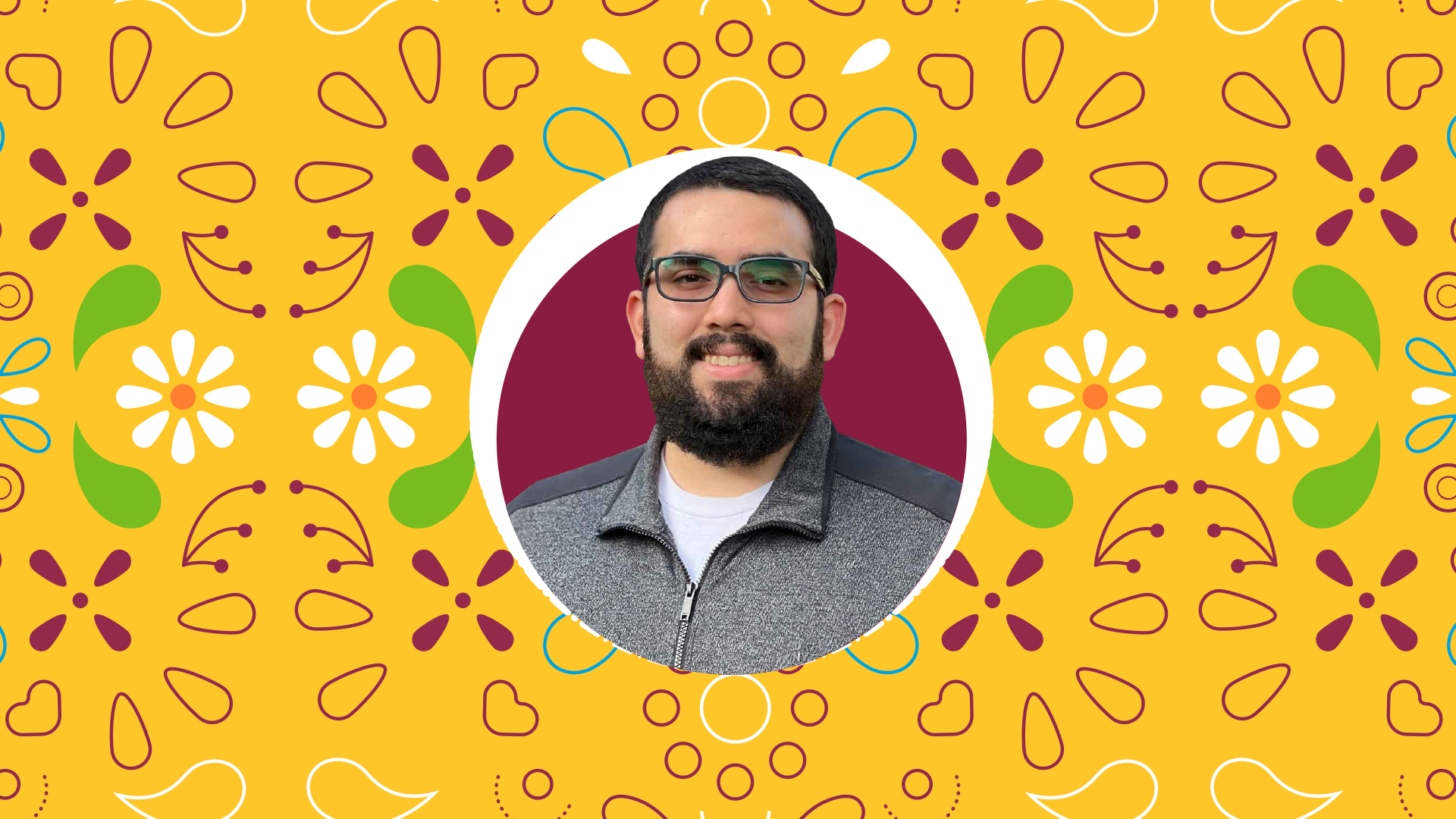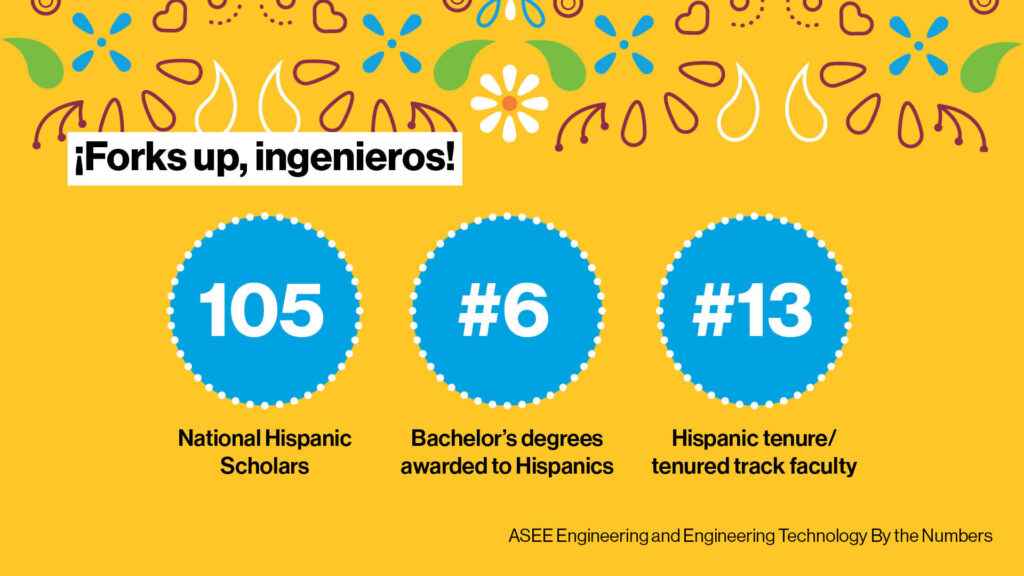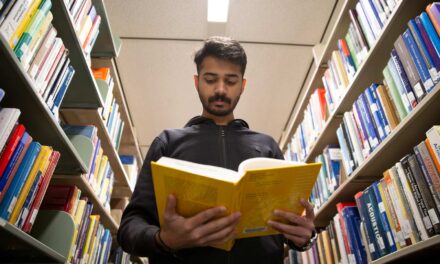
Helping Hispanic engineers thrive by building community
ASU doctoral student David Eduardo Flores-Prieto leads extensive advocacy efforts for increased Hispanic and Latinx representation in STEM from kindergarten through graduate school

Hispanic and Latinx representation in science, technology, engineering and math, or STEM, fields wasn’t much of a thought for David Eduardo Flores-Prieto when he was an undergraduate student in Monterrey, Mexico. Nearly all of the students, faculty members and role models at his university were Hispanic like him.
Even when Flores-Prieto spent a year as a graduate student at University College London, half the student body was made up of international students who shared his experience. The university also had a well-established and close-knit group of Hispanic students who supported each other.
Then he arrived in the United States for his doctoral studies at Arizona State University and immediately noticed a different landscape for Hispanic students in STEM.
In the U.S., according to 2020 statistics from the American Society for Engineering Education, 9% of master’s degrees and 7% of doctoral degrees in engineering fields are awarded to Hispanic graduates and only 4% of faculty members in engineering-related fields are Hispanic — representation that lags behind the total Hispanic population in the country at approximately 20%. Flores-Prieto found it difficult to identify role models and dedicated support networks tailored to the needs of Hispanic international graduate students like himself.
So, Flores-Prieto decided it was time to take the lead and become an advocate for his community.
“It was important for me to realize that if the change is going to be done, I have to contribute,” says Flores-Prieto, who is now in his third year as a biomedical engineering doctoral student at the Ira A. Fulton Schools of Engineering at ASU.
Since getting his start in advocacy, Flores-Prieto has worked diligently to help Hispanic and Latinx students thrive in biomedical engineering and STEM, not only at ASU but across the U.S.
Daniel E. Rivera, a professor of chemical engineering in the Fulton Schools who identifies as Hispanic, sees increased Hispanic and Latinx diversity — as well as diversity of all people — in engineering as something that strengthens society.
“We greatly benefit from sharing the skills, insights and distinct points of view that come from our Hispanic/Latinx culture and heritage,” Rivera says. “Diversity makes the efforts of David Flores-Prieto that much more worthwhile and appreciated.”
Building a support system from scratch
Flores-Prieto was excited to start working on neurodegenerative disease and traumatic brain injury research with his advisor, Sarah Stabenfeldt, an associate professor of biomedical engineering in the Fulton Schools. However, the move to a new country to start his doctoral program came at an especially difficult time.
“I started my program in January 2020, and in March 2020, COVID started,” he says, “so straight away I was isolated and it was really tough the first year.”
When Flores-Prieto realized ASU didn’t have an established group for Hispanic international graduate students like the one he’d been a part of at University College London, he decided he needed to create one. Within months of the beginning of the pandemic, he collaborated with some of his peers from Mexico and founded the Mexican Graduate Association for International Students at ASU.
The organization helps international graduate students with resources for a smooth transition to life in the U.S. as well as peer mentorship, professional networking and cultural events.
After more than a year of interacting only online, the association was able to have its first in-person event last year — a proud moment for Flores-Prieto. Finally, the group’s members were able to meet and enjoy trivia games, food and a fun experience with other Mexican international graduate students at ASU.
“Just knowing that a community exists that can support you, that’s what we wanted to do and I think we provided that,” says Flores-Prieto, who is thankful for the guidance he has gotten from the ASU Graduate College staff and the group’s faculty advisor, Professor Enrique R. Vivoni, to help fill this need for students like him.
Becoming part of a larger advocacy network
Flores-Prieto quickly expanded his advocacy work beyond ASU, joining a national, online organization called LatinXinBME. The group, founded by Brian Aguado and Ana María Porras, aims to diversify biomedical engineering in academia and industry through mentorship and a welcoming virtual community.
Flores-Prieto often serves as a mentor for undergraduate students in the LatinXinBME community who are thinking about graduate school — and in another mentorship program with undergraduate students at his alma mater in Mexico, the Monterrey Institute of Technology and Higher Education.
He finds that Hispanic international students may face cultural expectations and challenges specific to their communities. Through his mentorship role in LatinXinBME, Flores-Prieto had in-depth discussions on issues like supporting family back home on a graduate student salary — a topic many graduate students may have to confront when deciding to pursue advanced studies.
“Role models and mentors are extremely important, particularly for Hispanic and Latinx students who may choose careers in research and academia in STEM fields where multiple degrees are required and the ‘barriers to entry’ are high,” Rivera says. “Having an opportunity to talk to someone who can confirm that the challenges they face are not unique, battling ‘imposter syndrome’ or simply having someone who can pronounce your name properly can be very meaningful to a Hispanic or Latinx student.”
In addition to helping undergraduate students get to the next stage in their academic journeys as a mentor, Flores-Prieto also receives support from more experienced members of LatinXinBME who have gone through the same challenges he is now facing as a doctoral student.
“There are so many professionals at all levels. It’s a giant community that supports professional growth and helps get all its members where they want to be,” Flores-Prieto says. “There are several points in your training that you have these giant hurdles you have to go over and they just look so big sometimes that you don’t think there’s a way out. Just having people who went through that to talk it out helps.”
Leading diversity efforts on a national scale
Flores-Prieto recently earned another opportunity to help biomedical engineering students across the country when he was elected president of the National Student Chapter of the Society for Biomaterials. With the support of a strong team of student leaders, he is already planning many ways to make a difference and inspire future biomedical engineers from all backgrounds.
In this two-year role, Flores-Prieto manages Society for Biomaterials student chapters across the country and supports their operations and events, including Biomaterials Days like the one being hosted by the ASU chapter on October 10.
Events like these showcase how biomedical engineers make a difference in the world.
One of the speakers at the ASU event this year is Edward A. Botchwey, a professor at the Georgia Institute of Technology and current chair of the Society for Biomaterials Diversity, Equity and Inclusion Committee. Flores-Prieto previously heard Botchwey give a talk about his journey to address sickle cell disease, an underfunded issue that affects the Black community in the U.S. It was a pivotal moment for Flores-Prieto to see Botchwey, who is Black, take the lead on finding a solution for a problem affecting his community. It inspired him to work toward encouraging Hispanic scientists and engineers to do the same for issues in their communities.
Now Flores-Prieto is getting more involved in the Society for Biomaterials’ diversity, equity and inclusion activities. Based on the success of a past event for Historically Black Colleges and Universities, in which a panel of Black faculty members talked about biomedical engineering opportunities, Flores-Prieto is working to gather Hispanic faculty members for a panel aimed at Hispanic Serving Institutions, a distinction ASU earned this year.

Arizona State University was named a Hispanic-Serving Institution in 2022 by the U.S. Department of Education. The Ira A. Fulton Schools of Engineering at ASU is home to 105 National Hispanic Scholars, ranks No. 6 in the U.S. for bachelor’s degrees awarded to Hispanic graduates and No. 13 in the number of Hispanic tenure and tenure-track faculty members. Graphic by Dana Hernandez/ASU
A grassroots effort to encourage Hispanic children’s interests in STEM
While many of Flores-Prieto’s efforts focus on helping Hispanic students already in college and earning advanced degrees, he believes it’s important for outreach efforts to start early.
Flores-Prieto himself has been immersed in science his whole life — both his parents are physicians and encouraged him to go into medicine as well. His exposure to engineering educational opportunities helped him find an exciting career path in biomedical engineering.
However, he recognizes many Hispanic children may not have the same level of access to or awareness of STEM opportunities.
To help fill that gap, Flores-Prieto regularly volunteers for an organization called Letters to a Pre-Scientist, which pairs volunteers with a K-12 student pen pal. They write “snail mail” letters back and forth in which Flores-Prieto shares his STEM journey and explains how his pen pal’s interests intersect with engineering fields.
Though the program isn’t aimed at Hispanic students, many of the organization’s partner schools are in California where there is a large Hispanic population.
“It’s an effort of humanizing the STEM professionals, [so students are] not just thinking about a person in a lab coat,” Flores-Prieto says. “We’re just people and these are the careers we chose.”
Being exposed to the possibilities of engineering careers is what set Flores-Prieto on the path to earning a doctoral degree in biomedical engineering. When he learned about the tissue engineering field from reading a research journal article during his undergraduate studies, he thought the idea of being an engineer and creating things like artificial organs sounded awesome and it got him hooked on research.
“STEM professionals are involved in a lot of fun stuff that kids just don’t know about,” Flores-Prieto says. “So, we need to get them involved as early as possible.”
Contribute to the changes you want to see
Being so involved in advocacy work has not always been easy for biomedical engineering doctoral student and diversity advocate David Eduardo Flores-Prieto. He has had to overcome his shyness and introverted personality to take the lead and have the conversations necessary to make the changes he wanted to see happen for Hispanic communities in STEM fields.
Flores-Prieto encourages everyone to “help at whatever level you’re able to, however little you think it might be.”
Students at ASU have the opportunity to join many diversity-focused groups among nearly a thousand student organizations at ASU, and engineering students can get involved in numerous Fulton Student Organizations. These supportive communities include the Society of Hispanic Professional Engineers.
Or, Flores-Prieto says people can join outreach and mentorship programs to help future scientists and engineers get off to a strong start. He encourages others to get involved in Letters for a Pre-Scientist to connect with K-12 students who might not otherwise know STEM careers are for them, or the Women Leaders in STEAM mentorship program for female mentors and high school Latina mentees in science, technology, engineering, arts and mathematics, or STEAM.



































